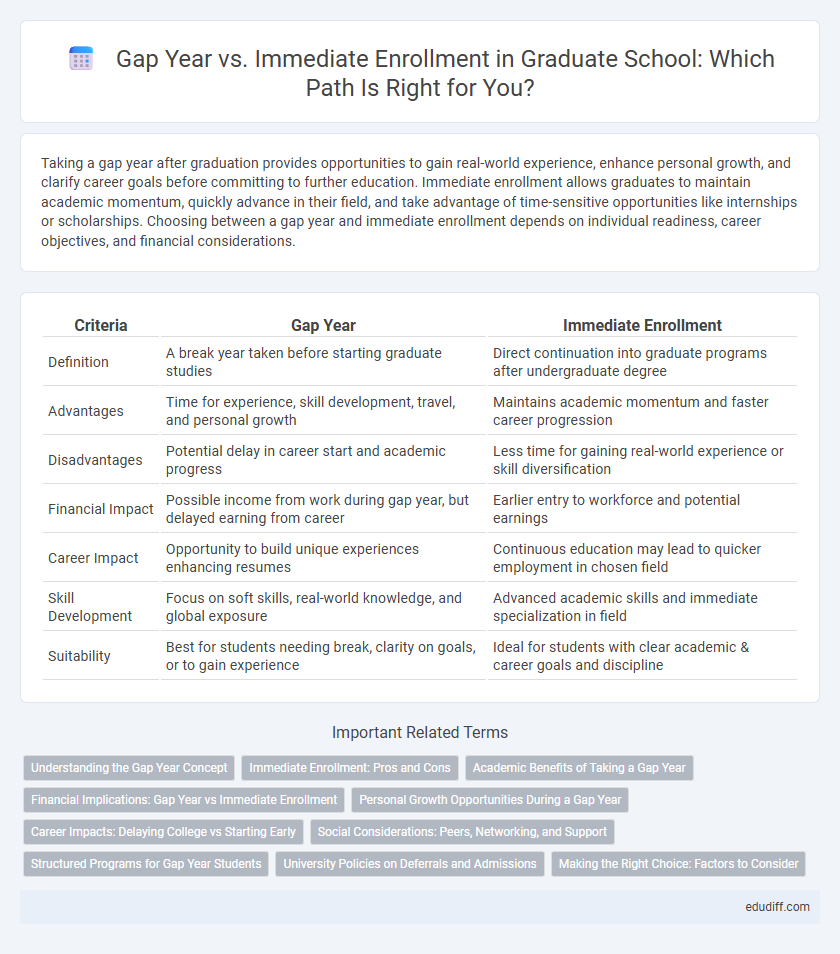Taking a gap year after graduation provides opportunities to gain real-world experience, enhance personal growth, and clarify career goals before committing to further education. Immediate enrollment allows graduates to maintain academic momentum, quickly advance in their field, and take advantage of time-sensitive opportunities like internships or scholarships. Choosing between a gap year and immediate enrollment depends on individual readiness, career objectives, and financial considerations.
Table of Comparison
| Criteria | Gap Year | Immediate Enrollment |
|---|---|---|
| Definition | A break year taken before starting graduate studies | Direct continuation into graduate programs after undergraduate degree |
| Advantages | Time for experience, skill development, travel, and personal growth | Maintains academic momentum and faster career progression |
| Disadvantages | Potential delay in career start and academic progress | Less time for gaining real-world experience or skill diversification |
| Financial Impact | Possible income from work during gap year, but delayed earning from career | Earlier entry to workforce and potential earnings |
| Career Impact | Opportunity to build unique experiences enhancing resumes | Continuous education may lead to quicker employment in chosen field |
| Skill Development | Focus on soft skills, real-world knowledge, and global exposure | Advanced academic skills and immediate specialization in field |
| Suitability | Best for students needing break, clarity on goals, or to gain experience | Ideal for students with clear academic & career goals and discipline |
Understanding the Gap Year Concept
A gap year is a deliberate pause between high school graduation and immediate college enrollment, allowing graduates to gain real-world experience, develop skills, and clarify academic or career goals. This period can include travel, internships, volunteering, or work opportunities, fostering personal growth and increased maturity. Understanding the gap year concept helps students make informed decisions about their educational trajectory and long-term success.
Immediate Enrollment: Pros and Cons
Immediate enrollment after graduation accelerates entry into the workforce, enabling quicker income generation and skill development in a professional setting. However, it may limit opportunities for personal growth, travel, or exploring diverse interests that a gap year can provide. Graduates often face increased pressure and reduced time for self-reflection, which can affect long-term career satisfaction and mental well-being.
Academic Benefits of Taking a Gap Year
Taking a gap year before enrolling in graduate studies significantly enhances academic performance by allowing students to gain practical experience, develop critical thinking skills, and clarify career goals. Research shows that gap year students often demonstrate higher motivation, improved time management, and greater academic engagement upon reentry into formal education. Structured gap year programs contribute to improved graduate degree completion rates and overall academic success.
Financial Implications: Gap Year vs Immediate Enrollment
Choosing a gap year can significantly impact financial planning, as it may delay income from employment while incurring additional costs such as travel or living expenses. Immediate enrollment in graduate programs often results in earlier access to career advancement and earning potential, potentially offsetting tuition fees through shorter time to employment. However, gap year experiences can enhance resumes and networking opportunities, which might lead to higher long-term earnings despite initial financial setbacks.
Personal Growth Opportunities During a Gap Year
Taking a gap year before enrolling in graduate school offers significant personal growth opportunities, such as developing self-discipline, exploring new cultures through travel, and gaining real-world work experience. These experiences enhance emotional intelligence and adaptability, which are essential skills for academic success and future career advancement. Graduate programs often value candidates with diverse life experiences, making a gap year a strategic choice for personal and professional development.
Career Impacts: Delaying College vs Starting Early
Taking a gap year before college can provide valuable real-world experience, enhance soft skills, and improve career clarity, potentially leading to better job placements after graduation. Immediate college enrollment accelerates degree completion, allowing graduates to enter the workforce sooner and start accumulating professional experience and income early. Research indicates that while gap years may delay earning potential initially, they often result in higher long-term career satisfaction and employability due to enhanced personal development.
Social Considerations: Peers, Networking, and Support
Choosing a gap year after graduation allows for expanded social networking opportunities through diverse experiences and varied peer interactions, fostering unique personal and professional connections. Immediate enrollment provides a cohesive peer group with shared academic goals, enhancing collaborative learning and immediate access to institutional support services. Social considerations include evaluating the balance between broadening networks during a gap year and maintaining consistent support systems within a structured academic environment.
Structured Programs for Gap Year Students
Structured programs for gap year students provide curated experiences that enhance personal development and academic readiness through internships, volunteer work, and skill-building workshops. These programs often partner with universities to offer credit recognition, ensuring a seamless transition to higher education after the gap year. Research shows that students who participate in structured gap year programs tend to have higher college retention rates and improved academic performance compared to immediate enrollment peers.
University Policies on Deferrals and Admissions
University policies on deferrals and admissions vary widely, with some institutions offering flexible gap year deferral options to secure a student's spot while others require immediate enrollment to maintain admission status. Institutions adopting rigid policies may risk losing applicants to competitors who accommodate gap year plans, impacting enrollment numbers and campus diversity. Clear guidelines on application deadlines, required documentation, and reapplication procedures are essential for applicants considering a gap year to navigate university expectations effectively.
Making the Right Choice: Factors to Consider
Assessing personal growth opportunities, career goals, and financial stability is crucial when choosing between a gap year and immediate enrollment after graduation. Evaluating how a gap year might enhance skills like adaptability and cultural awareness versus the momentum gained by continuing education promptly can impact long-term success. Tailoring the decision to individual academic interests, mental health needs, and job market demands ensures the right educational path is pursued.
Gap Year vs Immediate Enrollment Infographic

 edudiff.com
edudiff.com